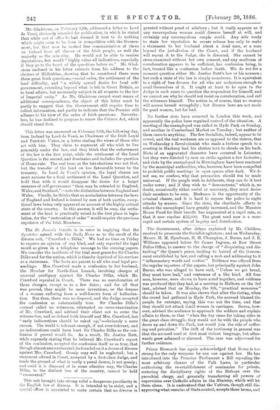The St. James's Gazette is in error in implying that
the Spectator agreed with the Daily News as to the result of the divorce suit, "Crawford v. Dilke." We had no time on Friday to express an opinion of any kind, and only reported the legal result as given in a telephone message to the evening papers. We consider the incidents of the trial most grave for Sir Charles Dilke and for the nation, which is thereby deprived of his services as a statesman. The facts are patent to all who read legal pro- eeedings. Mrs. Crawford made a confession to her husband, the Member for North-East Lanark, involving charges of unusual profligacy against Sir Charles Dilke, which Mr. Crawford repeated in Court. There was no corroboration of those charges, except as to a few dates ; and for all that was proved, they might be mere inventions, or the dreams of a woman suffering from a well-known form of hallucina- tion. But then, there was no disproof, and the Judge accepted the confession as substantially true. Sir Charles Dilke's counsel called no witnesses, attempted no cross-examination of Mr. Crawford, and advised their client not to enter the witness-box, and so defend both himself and Mrs. Crawford, lest "early indiscretions should be raked up,"—obviously a mere excuse. The world is tolerant enough, if not over-tolerant, and no indiscretions could have hurt Sir Charles Dilke as the con- fession if proved would do. As a result, Mr. Justice Butt, while expressly stating that he believed Mr. Crawford's report of the confession, accepted the confession itself as so true, that though almost uncorroborated, be founded on it a decree of divorce against Mrs. Crawford. Gossip may well be neglected ; but a statement offered in Court, accepted by a first-class Judge, and made the ground of what is really a penal decree, is not gossip ; and until it is disposed of in some effective way, Sir Charles Dilke, to the distinct loss of the country, cannot be held "exonerated?'


































 Previous page
Previous page